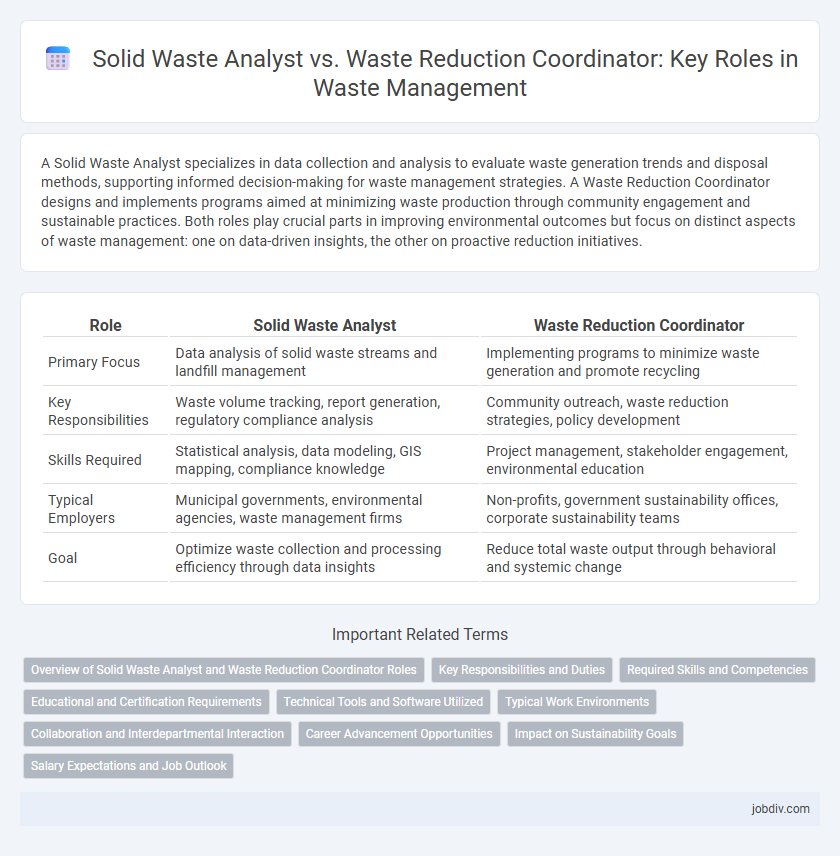A Solid Waste Analyst specializes in data collection and analysis to evaluate waste generation trends and disposal methods, supporting informed decision-making for waste management strategies. A Waste Reduction Coordinator designs and implements programs aimed at minimizing waste production through community engagement and sustainable practices. Both roles play crucial parts in improving environmental outcomes but focus on distinct aspects of waste management: one on data-driven insights, the other on proactive reduction initiatives.
Table of Comparison
| Role | Solid Waste Analyst | Waste Reduction Coordinator |
|---|---|---|
| Primary Focus | Data analysis of solid waste streams and landfill management | Implementing programs to minimize waste generation and promote recycling |
| Key Responsibilities | Waste volume tracking, report generation, regulatory compliance analysis | Community outreach, waste reduction strategies, policy development |
| Skills Required | Statistical analysis, data modeling, GIS mapping, compliance knowledge | Project management, stakeholder engagement, environmental education |
| Typical Employers | Municipal governments, environmental agencies, waste management firms | Non-profits, government sustainability offices, corporate sustainability teams |
| Goal | Optimize waste collection and processing efficiency through data insights | Reduce total waste output through behavioral and systemic change |
Overview of Solid Waste Analyst and Waste Reduction Coordinator Roles
A Solid Waste Analyst specializes in collecting, analyzing, and interpreting data related to waste generation, disposal, and recycling processes to improve solid waste management systems. A Waste Reduction Coordinator focuses on developing and implementing programs aimed at minimizing waste production, promoting sustainable practices, and increasing community participation in waste reduction efforts. Both roles contribute to effective waste management but differ in emphasis, with analysts centering on data-driven insights and coordinators prioritizing outreach and program development.
Key Responsibilities and Duties
A Solid Waste Analyst primarily focuses on collecting, analyzing, and interpreting data related to waste generation, disposal patterns, and recycling rates to support informed decision-making and policy development. A Waste Reduction Coordinator is responsible for designing and implementing programs aimed at minimizing waste production through community outreach, education, and collaboration with businesses and local governments. Both roles are critical in developing sustainable waste management strategies, with the analyst providing data-driven insights and the coordinator facilitating practical waste reduction initiatives.
Required Skills and Competencies
A Solid Waste Analyst requires strong data analysis skills, proficiency in waste management software, and expertise in regulatory compliance to evaluate waste streams and optimize disposal strategies. In contrast, a Waste Reduction Coordinator needs excellent communication skills, community engagement abilities, and knowledge of sustainability practices to implement waste minimization programs and promote behavioral change. Both roles demand project management capabilities, but the analyst emphasizes technical assessment while the coordinator focuses on education and policy development.
Educational and Certification Requirements
Solid Waste Analysts typically hold a bachelor's degree in environmental science, engineering, or related fields, often supplemented by certifications such as the Certified Solid Waste Manager (CSWM). Waste Reduction Coordinators generally require a similar educational background but emphasize certifications in waste management or sustainability, like the LEED Green Associate or Certified Waste Reduction Specialist (CWRS). Both roles value ongoing professional development to stay current with environmental regulations and waste reduction technologies.
Technical Tools and Software Utilized
Solid Waste Analysts utilize advanced data management software like ArcGIS, AutoCAD, and WasteLogics to analyze waste streams and optimize landfill usage, focusing on statistical and geographic information system (GIS) tools for precise waste quantification. Waste Reduction Coordinators employ project management platforms such as Trello and Microsoft Project alongside sustainability tracking software like Zero Waste Analytics to implement and monitor waste diversion programs effectively. Both roles leverage data visualization tools like Tableau to communicate findings and progress to stakeholders for informed decision-making.
Typical Work Environments
Solid Waste Analysts typically work in government agencies, environmental consulting firms, and waste management companies where they analyze data and develop strategies for efficient waste disposal. Waste Reduction Coordinators are often employed by municipal governments, non-profits, and educational institutions, focusing on community outreach and implementing waste minimization programs. Both roles involve collaboration with regulatory bodies and stakeholders but differ in their on-site presence and fieldwork intensity.
Collaboration and Interdepartmental Interaction
A Solid Waste Analyst provides critical data analysis and reporting that supports informed decision-making across departments, fostering collaboration with operations, environmental compliance, and policy teams. The Waste Reduction Coordinator drives cross-departmental initiatives by coordinating waste minimization strategies, engaging stakeholders from procurement to facilities management to ensure cohesive implementation. Both roles require strong interdepartmental communication skills to align objectives, share resources, and optimize waste management processes effectively.
Career Advancement Opportunities
A Solid Waste Analyst typically advances by specializing in data analysis, waste composition studies, and regulatory compliance, often progressing into environmental consulting or policy advisory roles. In contrast, a Waste Reduction Coordinator focuses on developing and implementing sustainable waste management programs, with career growth opportunities in project management, community outreach leadership, and sustainability strategy development. Both career paths offer strong advancement potential in environmental services but diverge between analytical expertise and program implementation leadership.
Impact on Sustainability Goals
A Solid Waste Analyst evaluates data on waste generation and disposal to identify inefficiencies and promote sustainable waste management practices, directly supporting sustainability goals by reducing landfill volumes and greenhouse gas emissions. A Waste Reduction Coordinator implements programs and community initiatives focused on minimizing waste production through education and policy development, thereby fostering long-term behavioral change aligned with environmental targets. Both roles are critical for advancing organizational sustainability, with the analyst providing data-driven insights and the coordinator driving practical waste reduction strategies.
Salary Expectations and Job Outlook
Solid Waste Analysts typically earn between $50,000 and $70,000 annually, with growth driven by increasing environmental regulations and urban expansion. Waste Reduction Coordinators, focusing on sustainability initiatives, command salaries ranging from $55,000 to $75,000 and benefit from a strong job outlook due to rising landfill diversion goals. Both roles experience steady demand, but Waste Reduction Coordinators often see greater growth potential in municipal and corporate sustainability programs.
Solid Waste Analyst vs Waste Reduction Coordinator Infographic

 jobdiv.com
jobdiv.com